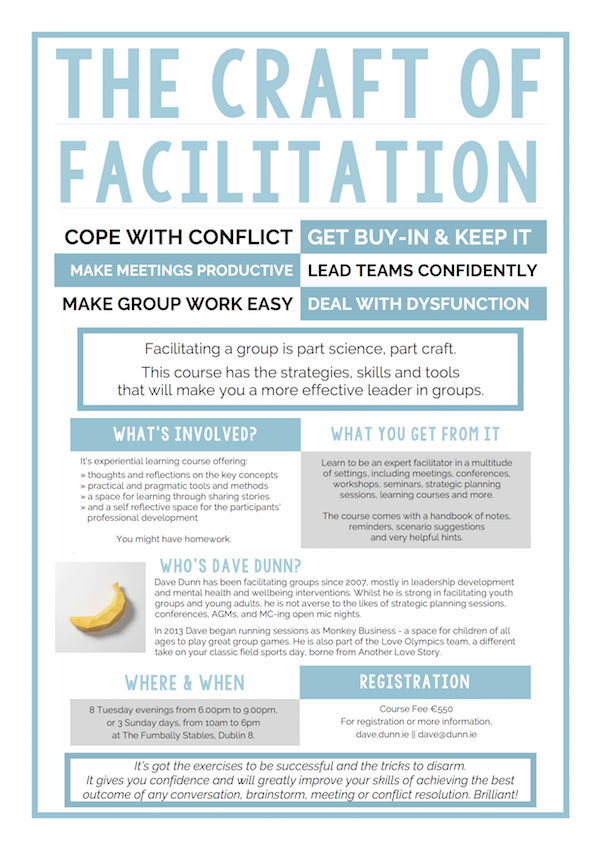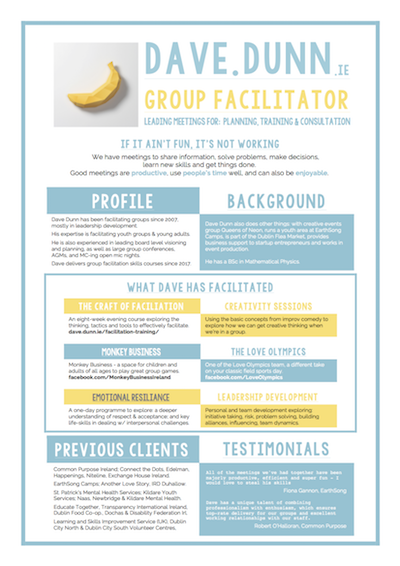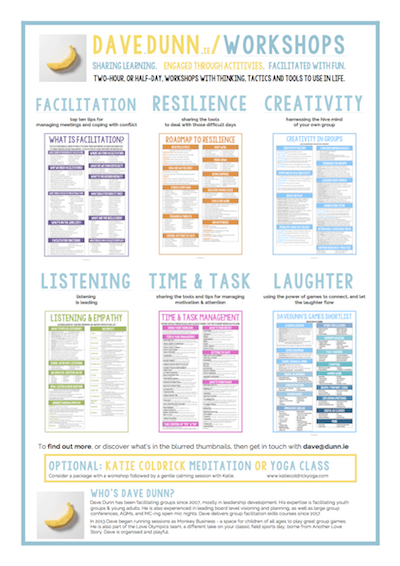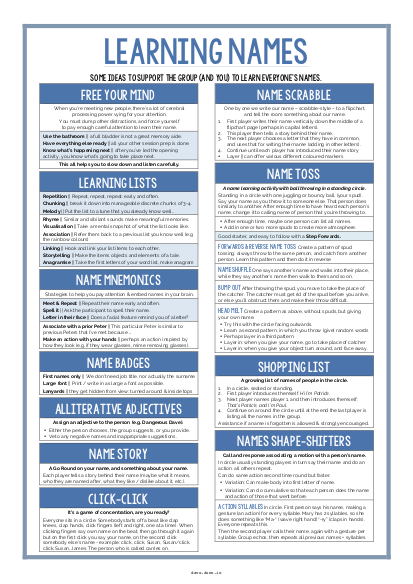What & Why of Group Facilitation
WHAT IS FACILITATION?
It’s the process of designing and running a successful meeting.
It’s also much more than that. It is …
Leading in Groups
Facilitation is a style of leadership in groups.
Stewarding Meetings
Facilitation is about taking care of the process of groups and meetings: the how, where, when, what happens next, who should speak next, who should not speak next. And making sure the group’s ‘why’ is being honoured.
Empowering Participants
Facilitation helps each group member to have a voice and be heard, and to be a part of the steps to success.
.
WHAT CHALLENGES DO FACILITATORS FACE?
Have you ever been leading or facilitating a group and had any of these concerns or challenges?
I’m supposed to be in charge, but I don’t feel capable
- I fear that the group will think I’m too bossy when I am timekeeping.
- What happens if I don’t know the answer to a question?
- Am I going to be criticised?
- Will the group think that I am biased?
- How do I gain enough respect from the group, so that they listen to me?
I’m not sure I have the skills
- What if I don’t include everybody and somebody feels isolated?
- I’m worried that I might forget to give the meeting structure?
- What happens if I don’t brief an exercise correctly?
- Will I be able to summarise people’s contributions?
- Can I cope with loud dominating voices which are intimidating?
It all seems so vague
- How do I maintain energy and momentum?
- How do I get everyone’s buy-in?
- How do I manage the tone of the meeting?
- What happens if I miss the nuances (politics) in the conversation?
It’s all a bit scary
- How do I deal with people more senior than me?
- What happens if there is vocal disagreement and outright conflict?
- How do we get agreement on something, when it looks like there isn’t any chance of that?
- How do you deal with participants who don’t want to take part?
- There’s an unspoken conflict between participants, which is an elephant in the room.
And then there’s the practical things
- How do I cope with late arrivals?
- I’m concerned that if I don’t end on-time, I’ll loose the respect of the group.
- What happens if we don’t reach any of the meetings goals?
- The pre-agreed agenda is all wrong: it’s over-loaded or not focusing on the important topics.
Or, you might be thrown a curve ball
- You discover that you don’t like the group: it’s style, pace or manner of communicating gets your back up.
- You present yourself to a group and they weren’t informed of your invitation, nor do accept you have the authority to lead the session.
- There’s a very powerful external force or influence on the group from someone outside of the room.
.
GOALS FOR FACILITATION SKILLS TRAINING
Being responsible for the success of a group/meeting requires an understanding of group dynamics, a suite of tactics to steer things in the right direction, the tact and discernment to know what to do and say, and a toolbox of methods suitable for various scenarios.
It also requires confidence, bravery and wisdom. And, the willingness to fail, gracefully if possible.
.
WHAT DOES SUCCESS LOOK LIKE?
A good meeting is pleasant, productive and purposeful.
Pleasant
Safe, secure and maybe even fun. Threats, bullying, tension, exploitation, undermining, conflict and aggression can and should be avoided and/or managed.
Productive & Co-operative
To make the best use of people’s time. If a meeting is a waste of people’s time, then there’s something wrong.
Purposeful
Ensuring that the activities of the group are aligned with the reason the group exists.
Even better, we can strive to have fair, fun and flowing group time
Fair
Where each voice is heard.
Fun
When joy is celebrated, and we can even have a laugh.
Flowing
That, even though some times might be tough, we can get to harmony and high-functioning.
.
WHEN DO YOU USE FACILITATION?
Chairing Meetings
- Staff meetings
- Board and Committee meetings
- Organisation AGMs
- Conference breakouts
- Brainstorming and planning meetings
- Decision making
- Interview panels (and being interviewed)
Managing Teams
- Delegating
- Coping with conflict
- Resolving tension
- Team building
Hosting Discussions
- Consultations
- Talks, panels and discussions
- Focus groups
Training & Teaching
- Learning courses
- Workshops
- Skills development
- Information giving
- Volunteer induction
- Yoga classes and retreats
Supporting Groups
- Peer groups (e.g. women groups, mens groups)
- Youth group



